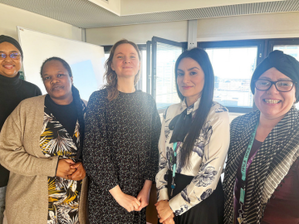Despite the collective efforts to promote inclusion and diversity, many migrant women continue to encounter challenging barriers deterring their participation in the Finnish labor market- an often-complicated landscape, where their talents and aspirations often go unrecognized and underutilized. In 2022 Yle published an article stating that Finland was “wasting” unemployed immigrant women’s potential. According to official data collected by the European Migration Network (EMN) and Eurostat labor statistics, the rate of employment among immigrant women was just 41 percent in 2020, while the corresponding figure for Finnish women was 72 percent. Reasons for women relocating to Finland are varied. Primarily, they arrive as family migrants, but other reasons include studying, work, and asylum seeking. Migrant women in Finland are faced with not just the disadvantage of being a woman, but also being a migrant. Integration opportunities vary greatly depending on factors such as educational background and employment status, creating disparities between, for instance, a refugee woman and a highly educated female migrant. This underscores the critical importance for decision-makers to craft and enact integration policies that are gender-specific. Are women’s needs-in this case migrant women, taken into consideration in the Finnish immigration policy? One of the biggest struggles for migrant women in their integration journey is employment. According to EMN’s most recent reports, the Finnish labor market consist of various discriminatory structures where even having a high level of education will not guarantee success for migrant women in the Finnish labor market. The FinMonik survey conducted in 2018-2019 stated that as many as 48 percent of third-country migrant women have completed a higher education degree. This can be presented as a great opportunity for integrating women in the Finnish working life. Until today, this potential has been unexploited. The biggest challenge for migrant women to find employment resides in the language requirements. Lacking Finnish or Swedish skills- specially for industries such as social welfare, healthcare, customer service, and teaching. Nonetheless, according to some studies the language requirements for migrant population are unreasonable. High level of Finnish- sometimes even a C1 level proficiency is required- even when it is not essential for the job. In other words, no matter how many degrees or how many other languages migrant population speak, not having a strong Finnish proficiency is a key issue for getting employed.
Unemployment has multifaceted effects on migrant women, influencing their well-being, self-identity, and social connections, among other aspects. Additionally, it directly impacts their immediate families, particularly in financial terms, given Finland's societal reliance on a dual-income model. In such a setup, the absence of employment for even one member can significantly diminish the family's disposable income. The OECD underscores the potential broader repercussions, highlighting that the precarious labor market position of mothers with migrant backgrounds could detrimentally affect their children's academic performance and integration. Therefore, Finland’s integration policy should develop a more effective path for migrant women to enter the labor market. Attention should be focused on understanding their needs, considering any additional factors such as cultural nuances, and family dynamics, their skills, their goals, and how to improve the language and integration training, even for those who are momentarily outside the labor force. As stated above, unemployment impacts migrant women in Finland in different ways. It is worth mentioning how a weak social network can slow down the overall integration process. Being at home, taking care of the family, and not having a space (such as workplace) for establishing social relationships makes it more difficult for migrant women to understand Finnish society, and develop their Finnish or Swedish skills. Social networks or “Networking” is considered one of the fundamental pillars of successfully entering the labor market in Finland.
Migrant women in Finland are affected across multiple levels: individually, within their families, and within society as a whole. Presently, Finnish policymakers are concentrating on the obstacles faced by migrant women. Should we adopt a broader perspective that also explores opportunities and potential, meticulously designing and implementing it? Non-governmental organizations must persist in furnishing migrant women with the practical means to integrate, fostering their inclusion in Finnish employment, all the while prioritizing their well-being. Yvette Ahonen Resources: https://yle.fi/a/3-12348269 https://yle.fi/a/3-12681231 Finnish Institute for Health and Welfare Integration Indicators database: B. Education and skills. Table: 11dw -- Highest completed qualification (Reg), 1995–2019. EMN Finland (2022), Key figures on immigration 2021 4 Martelin, T. et al. (2020), 4.2. Työ ja työllistymisen esteet. Teoksessa Nieminen T. et. al., Ulkomaista syntyperää olevien työ ja hyvinvointi Suomessa 2014. OECD EMN Study 2022, Maahanmuuttajanaisten kotoutuminen – Suomen kansallinen raportti Finnish Immigration Service
0 Comments
Leave a Reply. |
blogi - blogAjatuksia ja kokemuksia elämästä kahden kulttuurin keskellä.
Reflections and experiences from the life of intercultural families. kategoriat
All
osallistuToivotamme sinut lämpimästi tervetulleeksi osallistumaan blogiyhteisöömme: lue, kommentoi ja kirjoita!
Kirjoittajina voivat toimia kaikki kahden kulttuurin arkea elävät ja aiheesta kiinnostuneet. Kynnystä kirjoittamiselle ei tule nostaa liian korkealle ja kirjoittaa voi joko omalla nimellä tai nimimerkillä. Blogissa esitetyt näkökannat ja mielipiteet ovat kirjoittajien omia, eivätkä edusta Familian kantaa. Kahden kulttuurin arki on itsessään kiinnostavaa ja siitä kirjoittaminen voi avata myös itselle uusia näkökulmia! Blogikirjoituksia voi tarjota sähköpostitse (info@ familiary.fi) tai yhteydenottolomakkeen kautta. Lopullisen valinnan julkaistavista jutuista tekee Familian henkilökunta. Tervetuloa mukaan! participate!We warmly welcome you to participate in our blog community: read, comment, and write!
Anyone who lives and works in the world of intercultural families and is interested in the topic is welcome to contribute. The threshold for writing should not be too high, and you can write either under your own name or under a pseudonym. Keep in mind that the views and opinions expressed in the blog are those of the authors and do not represent the position of Familia. The everyday life of intercultural families is interesting and writing about it can also open new perspectives for you! Your story matters and helps to raise awareness about the opportunities and challenges within intercultural families. Blog contributions can be submitted by e-mail (info@ familiary.fi) or via our contact form. Final selection and edition of the stories to be published will be conducted by our staff. Welcome to join us! |
|
|
© Familia 2024



 RSS Feed
RSS Feed

